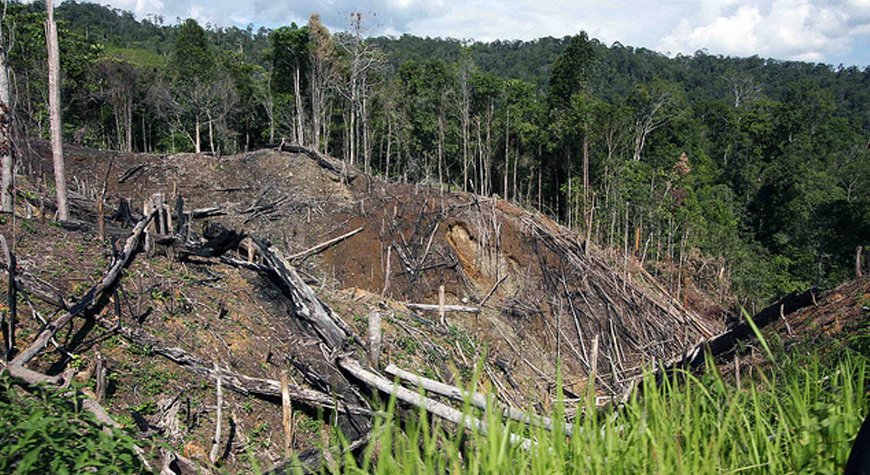I have a confession to make: this was the first time I read the vision and mission of any presidential candidates from back to back, even as I have been eligible to vote in Indonesia for nearly two decades. I can come up with many excuses, made up or otherwise, but truth be told, it did not feel urgent before.
This time it does and so I pored over Prabowo Subianto-Hatta Rajasa’s 9-page document and Joko Widodo-Jusuf Kalla’s 42-page statement. To prevent myself from committing verbal diarrhea on everything that bothered me (like how one candidate only has the word “tolerance” once throughout his document), I’d focus on the issues that I’ve studied and worked in for the past seven years: forests, particularly in relation to the environment and climate change.
A little context on why this is important: Indonesia is a developing country, and growth for the most part has involved clearing forests. We still have the third biggest tropical rainforests, but rapid deforestation made us one of the biggest emitters of greenhouse gas emissions.
New species are still consistently found – not surprising considering we’re estimated to have 11 percent of plants, 10 percent of mammals, and 16 percent of bird species on Earth – but iconic ones like Sumatran tigers and rhinos are being booted out of existence. In and around balding landscapes, quality of water and air declines.
The good news is both candidates mentioned the environment and forests. What I like about Jokowi’s is that it includes the need for better law enforcement and the resolution of overlapping licenses and land conflicts. It also aims (ambitiously) to raise awareness so that 80 percent of households will know and adopt environmentally friendly behaviour, one area that has escaped government’s attention so far. Both promise to push for certification of forest products to promote sustainability.
Massive replanting projects are also a priority that the candidates share. Prabowo vows to replant 77 million hectares of degraded forests, intercropped with plants like bamboo, jabon, sago and mangroves, while Jokowi mentions an even bigger area to rehabilitate at 100.7 million hectares. This is delusional, at best.
In the past four years, Indonesia had planted FOUR BILLION trees, President Susilo Bambang Yudhoyono proudly said in May (capital letters included in the speech). That translates into 1.6 million to 4 million hectares of land. According to Indonesia’s Bureau of Statistics, about 753,000 hectares of land were replanted between 2007 and 2011.
More importantly, this obsession with replanting is a misplaced enthusiasm. Replanting is great, but it is not the same and should be second to protecting intact forests, with all its biodiversity and environmental services.
We need to keep the forests that we have now, not rely on creating new ones, because once the biodiversity is lost and the carbon stock is released, they are mostly gone. Mostly forever. Both candidates do include forests conservation in their program, but only after their replanting commitments, and with very few details.
Repeat after me, please: replanting is good, protecting intact forests is better.
Equally disappointingly, climate change is reduced into single sentences in both statements, and neither supports current commitments to cut emissions by 26 percent from business-as-usual levels by 2020. Prabowo has already added the disclaimer “in line with Indonesia’s conditions” to his planned active role in climate change mitigation. I support Jokowi’s statement that climate change is an economic, rather than an environmental, issue, but he stops short from offering any details.
Replanting is great, but it is not the same and should be second to protecting intact forests, with all its biodiversity and environmental services.
These commitments, of course, cannot be evaluated in a vacuum. Prabowo’s first agenda is to attain annual economic growth of 7 percent, “moving towards more than 10 percent”. Jokowi did not mention a growth target.
From 2010 to 2013, Indonesia’s GDP grew between 5.6 percent and 6.5 percent per year. Some may argue that a 7 percent growth could be sustainable, for example if the energy subsidies were to be reallocated to debottlenecking infrastructure instead. I remain sceptical, especially if the aim is to accelerate it to faster than 10 percent per year.
Both candidates conveniently omit to state their commitments to extend the moratorium of new licenses on primary forests and peatlands, which currently protects an area of 63 million hectares. The moratorium, signed in 2011, has provided a breathing room to begin the process of resolving overlapping licenses and claims in Indonesia, and will expire in May 2015.
President Yudhoyono has called for his successor to extend the moratorium, echoed by leading NGOs such as Greenpeace, as obviously the job is far from done. Perhaps it is naïve to expect the candidates to support an initiative of the incumbent, but considering its importance in reducing emissions from deforestation and protecting our remaining intact forests, I was hoping they would see beyond politics. I guess I am naïve.
So, who has the better agenda on forests and climate change? I doubt anyone will make up their minds based on the candidates’ views on these issues, so I’ll reserve any judgment. I know I’ve made up my mind, regardless. But at least I feel more informed now.
About Leony Aurora
Leony works in communications, particularly those related to Mother Nature and how we live and grow. A former journalist, she thrives on personal stories and questions, in the hope that her quest will eventually lead to some answers. Writing keeps her sane although, paradoxically, it also induces bouts of insanity. Follow @leonyaurora on Twitter.








Comments